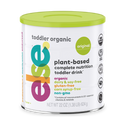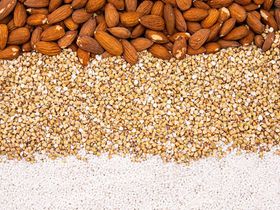Why Consider Dairy-Free Formula
Explore the benefits of dairy-free formula for infants and toddlers. Learn about allergy relief, improved digestion, health advantages, and ethical and environmental considerations.
Published June 11, 2024

I see daily how different children are. Having spent over a decade as a pediatric nutritionist, I have worked with hundreds of children and their families, and as a mom of two toddlers, I truly recognize the unique needs of each child. Different children need different things, nutrition included. While it may seem like there are endless infant and toddler formulas on the market, most of them are quite similar regarding the protein source. Many formulas use a cow’s milk formula, a soy formula, or some hydrolyzed formula, broken-down versions of the two. If your little one suffers from a cow's milk protein allergy or a soy protein allergy, don't fret! Thanks to Else Nutrition, a different infant formula now exists – one that is dairy and soy-free. Here's why you may want to consider trying a dairy-free formula for your little one.
Allergies, Cow’s Milk Protein Intolerance, Lactose Intolerance, Reflux
Cow’s milk allergy or cows’ milk protein intolerance is one of the most common allergies seen in infants and children. Between 5% and 15% of infants show symptoms suggesting adverse reactions to cow’s milk protein. It can manifest in many ways – some babies have reactions that involve the skin with hives or eczema, while others present with vomiting, abdominal pain, blood in stools, diarrhea, vomiting, facial swelling, wheezing, or poor growth due to malabsorption of nutrients. However, the prevalence of an IgE-mediated dairy allergy to cow’s milk is lower because many babies do not get tested when they present with certain symptoms (such as skin reactions), or they present with non IgE-mediated reactions, such as Food Protein- Induced Enterocolitis Syndrome (FPIES). So, in other words, there are likely more babies with a cow’s milk protein allergy than are actually tested for it.
Often, children present with other gastrointestinal troubles that are not related to the immune systems but can be triggered by cow’s milk or soy milk, such as reflux in babies or lactose intolerance in toddlers, which is an inability to digest lactose, the carbohydrate component, in cow’s milk.
» Learn more about the symptoms and management of milk allergies in babies
Health Benefits of Going Plant-Based
Plant-based diets have been linked to many positive health outcomes, such as reduced cardiovascular risk and lower incidence of certain cancers. Plant-based diets tend to be higher in fiber and antioxidants and lower in saturated fat. While there hasn’t been enough research that shows a direct health risk to consuming cows’ milk or goat milk treated with hormones and antibiotics, there are doubts about their safety; many parents opt to avoid that potential risk in their own diets, regardless if a cows' milk allergy is present, and want the same for their children’s diets. This is why many parents want to consider a dairy-free formula that provides similar calories, total fat, carbohydrates, protein, and micronutrients as cow’s milk-based formula, but without as much saturated fat and the potential risk of consuming animal byproducts.
» If you're considering dairy-free formula for your little one, learn why plant-based toddler nutrition is so beneficial
Environmental and Ethical Benefits
Another reason to consider opting for a dairy-free formula is the environmental advantage. Compared to animal-based products, a sustainably produced plant-based formula that uses whole ingredients ground up, rather than heavily diluted ingredients, helps the environment save some of its natural resources. And, for others, the ethical concerns of animal treatment guides them to avoid all animal products.
The content and advice provided in this article is for informational purposes only and is not a substitute for medical diagnosis, treatment, advice for specific medical conditions. Always consult a pediatrician to understand the individual needs of your child.









